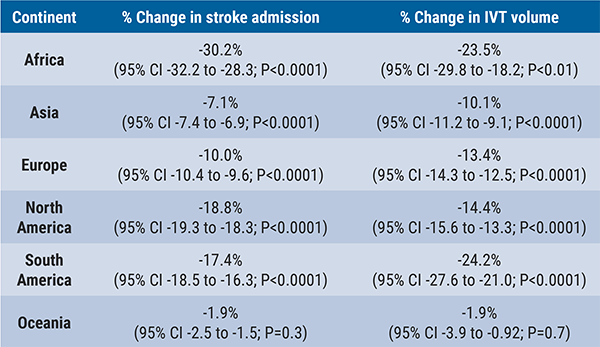Data was collected from 457 stroke centres in 70 countries, covering 6 continents [1]. Under-resourced countries, low-income regions, and primary stroke centres were the main targets. Results were presented by Dr Thanh Nguyen (Boston University School of Medicine, MA, USA).
During the first pandemic peak from March to June 2020, there were 11.5% fewer stroke admissions (n=80,894) than in the 4 preceding months (n=91,373; P=0.0001). Reduction rates were especially high in Africa and North America (see Table). COVID-19 hospitalisations per site correlated with declined rates in stroke admissions. There were similar drops in the rate of IVT attempts (-13.2%; P<0.0001) and in IVT transfers during the pandemic peak months (-11.9%; P=0.001).
Table: Change in stroke admission and IVT volume immediately before and during the COVID-19 pandemic [1]

Dr Nguyen considered the global decline in stroke care during the first pandemic wave to be irrespective of COVID-19 hospital burden or pre-pandemic stroke and IVT volumes.A recovery of stroke hospitalisation volume by 9.5% was observed over the 2 later months (May/June) versus the 2 earlier months (March/April) of the pandemic, with greater recovery in hospitals with lower COVID-19 hospitalisation volume, high volume stroke centre, and in comprehensive stroke centres (P<0.0001). This recovery did not apply to IVT. Stroke rate was 1.48% across 119,967 COVID-19 hospitalisations; COVID-19 infection was diagnosed in 3.3% of stroke admissions.
- Nguyen TN, et al. Global impact of the COVID-19 pandemic on stroke care and intravenous thrombolysis. N3.002, AAN 2021 Virtual Congress, 17-22 April.
Copyright ©2021 Medicom Medical Publishers
Posted on
Previous Article
« Stroke uncommon in critically ill COVID-19 patients Next Article
Tolebrutinib reduces brain lesions in very active MS »
« Stroke uncommon in critically ill COVID-19 patients Next Article
Tolebrutinib reduces brain lesions in very active MS »
Related Articles
© 2024 Medicom Medical Publishers. All rights reserved. Terms and Conditions | Privacy Policy
HEAD OFFICE
Laarderhoogtweg 25
1101 EB Amsterdam
The Netherlands
T: +31 85 4012 560
E: publishers@medicom-publishers.com

